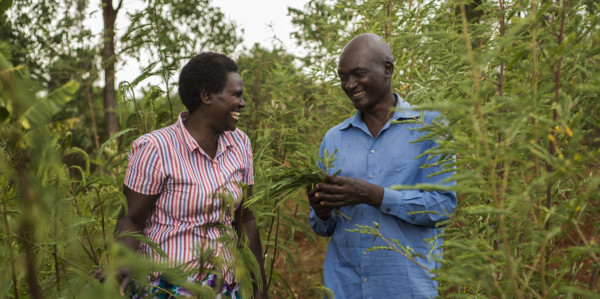We can reduce world hunger – there are solutions
Date
October 17, 2019
After four years of working with agroforestry, Benta Muga’s and John Oruka’s farm in Kisumu, Kenya, is thriving. In the photo: Benta Muga and John Oruko, Kenya Photo by: Amunga Eshuchi
Today is World Food Day. The United Nations Food and Agriculture Organization (FAO) notes that some 820 million people suffer from hunger. This is the fourth consecutive year that the figure has risen after many years of decline. A decisive cause is climate change affecting agricultural production. We are facing a number of global challenges at the same time. The UN Climate Panel IPCCs shows that land use activities such as forestry and agriculture account for 23 per cent of human emissions of greenhouse gases and that we must change to sustainable use if we are to achieve the goals of the Paris Climate Change Agreement. Up to one million of the world’s estimated eight million plant and animal species are threatened with extinction. More than three-quarters of the crops are dependent on pollinating insects, such as bees, many of which are now threatened.
The majority of people living in extreme poverty live in the countryside and depend on agriculture for their survival.. Small-scale agriculture still accounts for most of the world’s food production. Efforts to improve the opportunities for farmers in countries with widespread poverty are crucial to prevent rising hunger. These are people who struggle to create livelihoods in a changing climate, with fluctuating world market prices and depending on the ecosystems in which they live for their livelihood. The EAT-Lancet report on food, health and nutrition highlights the importance of agriculture having to go from producing large volumes of a few crops to producing a variety of crops, and that we must give a greater focus on nutritious diets.
There are solutions. One example, which the UN Climate Panel has cited, is cultivation systems such as agroforestry, tree farming, where trees are planted among crops and livestock. Agroforestry can provide a variety of crops and create resilience to climate change such as drought and floods while carbon dioxide is bound in trees and soil.
To achieve the best results in the work against hunger, a strong gender equality focus is needed. FAO estimates that if women and men had the same opportunities and access to resources as land, the crops would increase so much that 100-150 million people would not have to go hungry.
Creating sustainable food systems requires a variety of efforts from different actors. We now call on the Swedish government, investors, the research community, the business community and civil society organizations to increase cooperation aiming at:
- Increase knowledge development on sustainable food systems for nutritious food.
- Develop value chains, and create demand, for a greater variety of crops and nutritious food produced with a rights perspective.
- Advocate for policy instruments such as agricultural subsidies aiming at diversifying crops to reduce hunger, increase nutrition and contribute to sustainable agriculture.
- Increase the understanding and knowledge that equality is key (or crucial?) to the work against poverty and hunger.
- Prioritize agriculture in development cooperation, as well as sustainable production methods that favor both climate, biodiversity, and nutritious diets.
Together, we must contribute to globally sustainable food systems that fight hunger!
